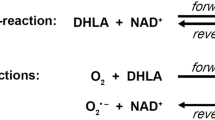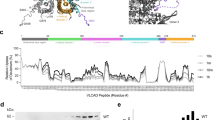Abstract
Medium-chain acyl-coenzyme-A dehydrogenase (MCAD) catalyzes the first step of mitochondrial beta-oxidation for medium-chain acyl-CoAs. Mutations in the ACADM gene cause MCAD deficiency presenting with life-threatening symptoms during catabolism. Since fatty-acid-oxidation disorders are part of newborn screening (NBS), many novel mutations with unknown clinical relevance have been identified in asymptomatic newborns. Eighteen of these mutations were separately cloned into the human ACADM gene, heterologously overexpressed in Escherichia coli and functionally characterized by using different substrates, molecular chaperones, and measured at different temperatures. In addition, they were mapped to the three-dimensional MCAD structure, and cross-link experiments were performed. This study identified variants that only moderately affect the MCAD protein in vitro, such as Y42H, E18K, and R6H, in contrast to the remaining 15 mutants. These three mutants display residual octanoyl-CoA oxidation activities in the range of 22 % to 47 %, are as temperature sensitive as the wild type, and reach 100 % activity with molecular chaperone co-overexpression. Projection into the three-dimensional protein structure gave some indication as to possible reasons for decreased enzyme activities. Additionally, six of the eight novel mutations, functionally characterized for the first time, showed severely reduced residual activities < 5 % despite high expression levels. These studies are of relevance because they classify novel mutants in vitro on the basis of their corresponding functional effects. This basic knowledge should be taken into consideration for individual management after NBS.





Similar content being viewed by others
Abbreviations
- MCADD:
-
Medium-chain acyl-CoA dehydrogenase deficiency
- NBS:
-
Newborn screening
- FAD:
-
Flavin adenine dinucleotide
- CoA:
-
Coenzyme A
- BS3 :
-
Bis(sulfosuccinimidyl) suberate
References
Andresen BS, Bross P, Udvari S et al (1997) The molecular basis of medium-chain acyl-CoA dehydrogenase (MCAD) deficiency in compound heterozygous patients: is there correlation between genotype and phenotype? Hum Mol Genet 6(5):695–707
Andresen BS, Dobrowolski SF, O’Reilly L et al (2001) Medium-chain acyl-CoA dehydrogenase (MCAD) mutations identified by MS/MS-based prospective screening of newborns differ from those observed in patients with clinical symptoms: identification and characterization of a new, prevalent mutation that results in mild MCAD deficiency. Am J Hum Genet 68(6):1408–1418
Arnold GL, Saavedra-Matiz CA, Galvin-Parton PA et al (2010) Lack of genotype-phenotype correlations and outcome in MCAD deficiency diagnosed by newborn screening in New York State. Mol Genet Metab 99(3):263–268
Bradford MM (1976) A rapid and sensitive method for the quantitation of microgram quantities of protein utilizing the principle of protein-dye binding. Anal Biochem 72:248–254
Bross P, Engst S, Strauss AW, Kelly DP, Rasched I, Ghisla S (1990) Characterization of wild-type and an active site mutant of human medium chain acyl-CoA dehydrogenase after expression in Escherichia coli. J Biol Chem 265(13):7116–7119
Bross P, Jespersen C, Jensen TG et al (1995) Effects of two mutations detected in medium chain acyl-CoA dehydrogenase (MCAD)-deficient patients on folding, oligomer assembly, and stability of MCAD enzyme. J Biol Chem 270(17):10284–10290
Chohan KK, Jones M, Grossmann JG, Frerman FE, Scrutton NS, Sutcliffe MJ (2001) Protein dynamics enhance electronic coupling in electron transfer complexes. J Biol Chem 276(36):34142–34147
Cornelius N, Frerman FE, Corydon TJ et al (2012) Molecular mechanisms of riboflavin responsiveness in patients with ETF-QO variations and multiple acyl-CoA dehydrogenation deficiency. Hum Mol Genet 21(15):3435–3448
Dessein AF, Fontaine M, Andresen BS et al (2010) A novel mutation of the ACADM gene (c.145C > G) associated with the common c.985A > G mutation on the other ACADM allele causes mild MCAD deficiency: a case report. Orphanet J Rare Dis 5:26
Frerman FE (1988) Acyl-CoA dehydrogenases, electron transfer flavoprotein and electron transfer flavoprotein dehydrogenase. Biochem Soc Trans 16(3):416–418
Gobin-Limballe S, McAndrew RP, Djouadi F, Kim JJ, Bastin J (2010) Compared effects of missense mutations in Very-Long-Chain Acyl-CoA dehydrogenase deficiency: combined analysis by structural, functional and pharmacological approaches. Biochim Biophys Acta 1802(5):478–484
Gregersen N, Bross P, Andresen BS (2004) Genetic defects in fatty acid beta-oxidation and acyl-CoA dehydrogenases. Molecular pathogenesis and genotype-phenotype relationships. Eur J Biochem FEBS 271(3):470–482
Gregersen N, Andresen BS, Pedersen CB, Olsen RK, Corydon TJ, Bross P (2008) Mitochondrial fatty acid oxidation defects–remaining challenges. J Inherit Metab Dis 31(5):643–657
Grosse SD, Khoury MJ, Greene CL, Crider KS, Pollitt RJ (2006) The epidemiology of medium chain acyl-CoA dehydrogenase deficiency: an update. Genet Med Off J Am Coll Med Genet 8(4):205–212
Keyser B, Muhlhausen C, Dickmanns A et al (2008) Disease-causing missense mutations affect enzymatic activity, stability and oligomerization of glutaryl-CoA dehydrogenase (GCDH). Hum Mol Genet 17(24):3854–3863
Lee HJ, Wang M, Paschke R, Nandy A, Ghisla S, Kim JJ (1996) Crystal structures of the wild type and the Glu376Gly/Thr255Glu mutant of human medium-chain acyl-CoA dehydrogenase: influence of the location of the catalytic base on substrate specificity. Biochemistry 35(38):12412–12420
Liebig M, Schymik I, Mueller M et al (2006) Neonatal screening for very long-chain acyl-coA dehydrogenase deficiency: enzymatic and molecular evaluation of neonates with elevated C14:1-carnitine levels. Pediatrics 118(3):1065–1069
Maier EM, Gersting SW, Kemter KF et al (2009) Protein misfolding is the molecular mechanism underlying MCADD identified in newborn screening. Hum Mol Genet 18(9):1612–1623
Matsubara Y, Narisawa K, Miyabayashi S et al (1990) Identification of a common mutation in patients with medium-chain acyl-CoA dehydrogenase deficiency. Biochem Biophys Res Commun 171(1):498–505
McKinney JT, Longo N, Hahn SH et al (2004) Rapid, comprehensive screening of the human medium chain acyl-CoA dehydrogenase gene. Mol Genet Metab 82(2):112–120
Nichols MJ, Saavedra-Matiz CA, Pass KA, Caggana M (2008) Novel mutations causing medium chain acyl-CoA dehydrogenase deficiency: under-representation of the common c.985 A > G mutation in the New York state population. Am J Med Genet A 146A(5):610–619
O’Reilly L, Bross P, Corydon TJ et al (2004) The Y42H mutation in medium-chain acyl-CoA dehydrogenase, which is prevalent in babies identified by MS/MS-based newborn screening, is temperature sensitive. Eur J Biochem FEBS 271(20):4053–4063
Purevsuren J, Kobayashi H, Hasegawa Y et al (2009) A novel molecular aspect of Japanese patients with medium-chain acyl-CoA dehydrogenase deficiency (MCADD): c.449-452delCTGA is a common mutation in Japanese patients with MCADD. Mol Genet Metab 96(2):77–79
Rhead WJ (2006) Newborn screening for medium-chain acyl-CoA dehydrogenase deficiency: a global perspective. J Inherit Metab Dis 29(2–3):370–377
Schatz UA, Ensenauer R (2010) The clinical manifestation of MCAD deficiency: challenges towards adulthood in the screened population. J Inherit Metab Dis 33(5):513–520
Schmiesing J, Schluter H, Ullrich K, Braulke T, Muhlhausen C (2014) Interaction of glutaric aciduria type 1-related glutaryl-CoA dehydrogenase with mitochondrial matrix proteins. PLoS One 9(2):e87715
Smith EH, Thomas C, McHugh D et al (2010) Allelic diversity in MCAD deficiency: the biochemical classification of 54 variants identified during 5 years of ACADM sequencing. Mol Genet Metab 100(3):241–250
Sturm M, Herebian D, Mueller M, Laryea MD, Spiekerkoetter U (2012) Functional effects of different medium-chain acyl-CoA dehydrogenase genotypes and identification of asymptomatic variants. PLoS One 7(9):e45110
Swigonova Z, Mohsen AW, Vockley J (2009) Acyl-CoA dehydrogenases: dynamic history of protein family evolution. J Mol Evol 69(2):176–193
Tanaka K, Gregersen N, Ribes A et al (1997) A survey of the newborn populations in Belgium, Germany, Poland, Czech Republic, Hungary, Bulgaria, Spain, Turkey, and Japan for the G985 variant allele with haplotype analysis at the medium chain Acyl-CoA dehydrogenase gene locus: clinical and evolutionary consideration. Pediatr Res 41(2):201–209
ter Veld F, Mueller M, Kramer S et al (2009) A novel tandem mass spectrometry method for rapid confirmation of medium- and very long-chain acyl-CoA dehydrogenase deficiency in newborns. PLoS One 4(7):e6449
Toogood HS, van Thiel A, Basran J, Sutcliffe MJ, Scrutton NS, Leys D (2004) Extensive domain motion and electron transfer in the human electron transferring flavoprotein.medium chain Acyl-CoA dehydrogenase complex. J Biol Chem 279(31):32904–32912
Yokota I, Indo Y, Coates PM, Tanaka K (1990) Molecular basis of medium chain acyl-coenzyme A dehydrogenase deficiency. an A to G transition at position 985 that causes a lysine-304 to glutamate substitution in the mature protein is the single prevalent mutation. J Clin Invest 86(3):1000–1003
Yokota I, Coates PM, Hale DE, Rinaldo P, Tanaka K (1991) Molecular survey of a prevalent mutation, 985A-to-G transition, and identification of five infrequent mutations in the medium-chain Acyl-CoA dehydrogenase (MCAD) gene in 55 patients with MCAD deficiency. Am J Hum Genet 49(6):1280–1291
Yusupov R, Finegold DN, Naylor EW, Sahai I, Waisbren S, Levy HL (2010) Sudden death in medium chain acyl-coenzyme a dehydrogenase deficiency (MCADD) despite newborn screening. Mol Genet Metab 101(1):33–39
Ziadeh R, Hoffman EP, Finegold DN et al (1995) Medium chain acyl-CoA dehydrogenase deficiency in Pennsylvania: neonatal screening shows high incidence and unexpected mutation frequencies. Pediatr Res 37(5):675–678
Zschocke J, Schulze A, Lindner M et al (2001) Molecular and functional characterisation of mild MCAD deficiency. Hum Genet 108(5):404–408
Acknowledgments
We kindly acknowledge Annette Seibt for technical advice and support.
Conflict of interest
None.
Author information
Authors and Affiliations
Corresponding author
Additional information
Communicated by: Niels Gregersen
Kira-Lee Koster and Marga Sturm equally contributed to this study
Electronic supplementary material
Below is the link to the electronic supplementary material.
Supplemental table S1
(DOC 50 kb)
Supplemental ESM2
Oligomerization of wild-type and mutant MCAD: Extracts of wild type and mutant MCAD proteins after cross-linkage with (+) and without (-) cross-linker BS³, SDS-PAGE and western blot analysis. The positions of monomer (67 kDa), dimers (134 kDa) and tetramers (268 kDa) are indicated. The identities of the heteromeric MCAD-immunoreactive complexes are unknown. Three independent experiments were performed (GIF 113 kb)
Rights and permissions
About this article
Cite this article
Koster, KL., Sturm, M., Herebian, D. et al. Functional studies of 18 heterologously expressed medium-chain acyl-CoA dehydrogenase (MCAD) variants. J Inherit Metab Dis 37, 917–928 (2014). https://doi.org/10.1007/s10545-014-9732-5
Received:
Revised:
Accepted:
Published:
Issue Date:
DOI: https://doi.org/10.1007/s10545-014-9732-5




